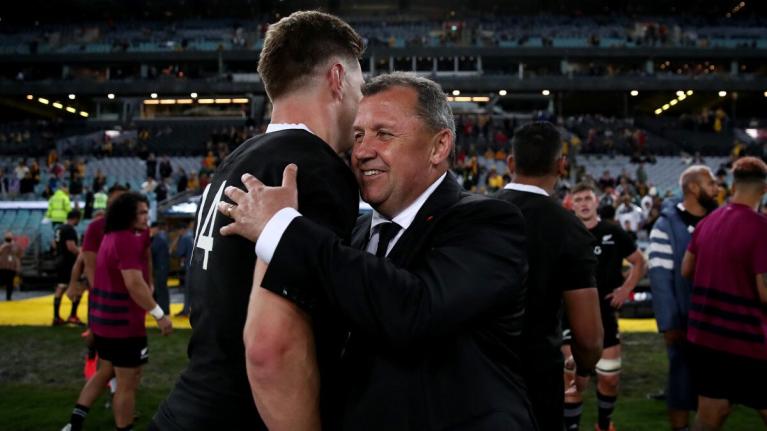'It put me to sleep': Ian Foster on Lions-Springboks second test

The rugby world is watching a high-stakes series of test rugby play out over in South Africa that, according to All Blacks head coach Ian Foster, has descended into low-risk rugby where teams "are afraid" to play.
Speaking to the media ahead of the first Bledisloe Cup test against the Wallabies, Foster admitted he had watched the second test of the series between the Lions and Springboks, but joked dryly that it put him to sleep watching it.
"I watched it between 10pm and 1am last night, it put me to sleep," Foster said.
The All Blacks coach spoke of the last two Lions series becoming very tight affairs, while this current one has become a "slugfest" as both teams employ similar tactics in search of a series win.
"The Lions series, the one we had here, the one over there, it's become very tight, almost risk-free type of series, aren't they? Teams are almost afraid to play, they are just relying on a low-risk strategy," he said.
"So we are seeing two teams who desperately want to win a big series playing low-risk, highly-effective rugby.
"Both of them are good at the close contact stuff, the close quarter fighting, the kick and chase, and the pressure game. Two teams playing a similar style, it's a bit of a slugfest."
Springboks director of rugby Rassie Erasmus has stolen the show during the series with his off-field antics on social media and as the team's water boy, but Foster insists that is not the way the All Blacks will go about their business.
"Well I think I might run water on Saturday," Foster joked, "Looks like quite an effective strategy.
"Look, he is who he is, they've got their strategies about how they go about things, it's certainly not ours."
Probed again on the style of rugby that seems to be pervasive in the Lions tests, Foster said that the two teams don't like playing against line speed, and the obvious answer then is to kick repeatedly.
Foster added the risk-reward equation has been skewed in that direction due to the type of defence being employed.
"That's test match rugby where stakes are high, it's the whole risk versus reward, isn't it?" he asked.
"You've got two teams over there, who want to get up, their line speed is really strong. It's all about stopping.
"We've been criticised in the past for not being able to play around and through line speed, but what you are seeing is two teams that don't like playing against line speed either.
"So what do they do? They kick. That's the answer if you are not willing to play a slightly more risky game. Everyone will choose a different way."
After coming under fire in the wake of the first test, Foster threw his support behind the referees, saying that there is "no doubt" the teams have to support the men in the middle.
He said that coaches have to do the right thing and make sure they are supporting the game without making it "impossible" to referee.
"We've got to support the referees, there's no doubt about it. We can have our gripes behind the scenes and that's alright, we've felt like that at times, we felt a bit like that last year, but we know the guys out in the middle are trying to do the best they can and it's a tough job.
"We have just got to make sure that we support the game and do the right thing.
"The media and people want us to express views, so it's getting that balance between how much do you say and what you're really thinking versus how much do we make sure we are not making it an impossible game to referee."
Latest Comments
For some reason he becomes diffident and dreams his way through games on occasion. It looked as he had no appetite for the contest.
Go to commentsI suspect the only way Kirifi makes the ABs is if the selectors want an NZ version of Kwaga Smith. And that implies we go 6-2 or 7-1 and there is the option for one or two of the forward to cover midfield. Not impossible, but I don’t think it’s likely.
Go to comments